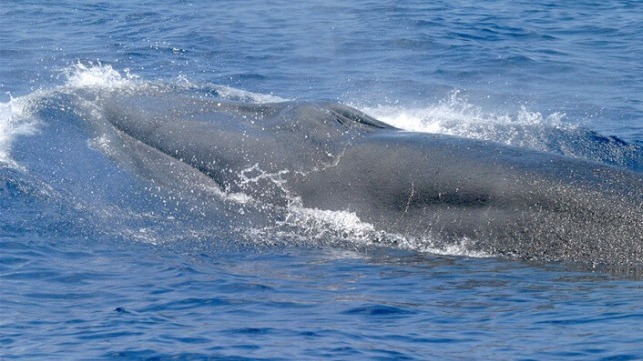BOEM Schedules Oil Lease Auctions in Rice's Whale Habitat

Yielding to a court order, the U.S. Bureau of Ocean Energy Management (BOEM) has agreed to hold an offshore oil auction covering 73 million acres in the Gulf of Mexico, including 6 million acres previously excluded for the protection of the endangered Rice's whale.
The Rice's whale is a relative of the Bryde's whale, and is found only in the Gulf of Mexico. It has been known to science for decades, but was only formally confirmed as a separate species in 2021, when researchers at NOAA were able to obtain a full carcass to examine for the first time. Estimates suggest that fewer than 50 individuals remain.
Last year, more than 100 marine scientists called for "excluding leasing and other [oil and gas] activities from the whale's habitat," warning that the Rice's whale may soon become the first large whale species to go extinct due to human activity.
In response to these concerns and petitions from environmental groups, BOEM removed Rice's whale habitat areas from a federal lease auction scheduled for September 27. It also asked offshore oil and gas operators to slow traffic to 10 knots and observe a daylight-only policy for crossings of the 100-400 meter depth contour, where the whales are believed to spend time. The rule would have effectively stalled nighttime transits to and from platforms.
Shell, Chevron, the American Petroleum Institute and the State of Louisiana sought an injunction to prohibit BOEM from implementing these new rules in the next lease auction round. Judge James Cain of the 5th District Court ruled in their favor, and BOEM was forced to delay its next lease sale while litigation continued.
The agency did not immediately give a timeline for when the court-ordered auction would occur. Last week, Cain followed up and ordered BOEM to hold the auction in December. BOEM has agreed to comply, and will carry out the lease auction on December 20.
“Energy independence scored an important win . . . with the Fifth Circuit decision lifting unjustified restrictions on oil and natural gas vessels and restoring acreage for offshore energy development," said American Petroleum Institute SVP Ryan Meyers, celebrating the court's ruling. "The U.S. Gulf of Mexico plays a critical role in maintaining affordable, reliable American energy production, and [the] decision creates greater certainty for the essential energy workforce and the entire Gulf Coast economy.”
NOAA has also turned down a petition to slow vessel traffic in Rice's whale habitat areas, saying that it needs to follow a more deliberate regulatory process before imposing limits.
No comments:
Post a Comment